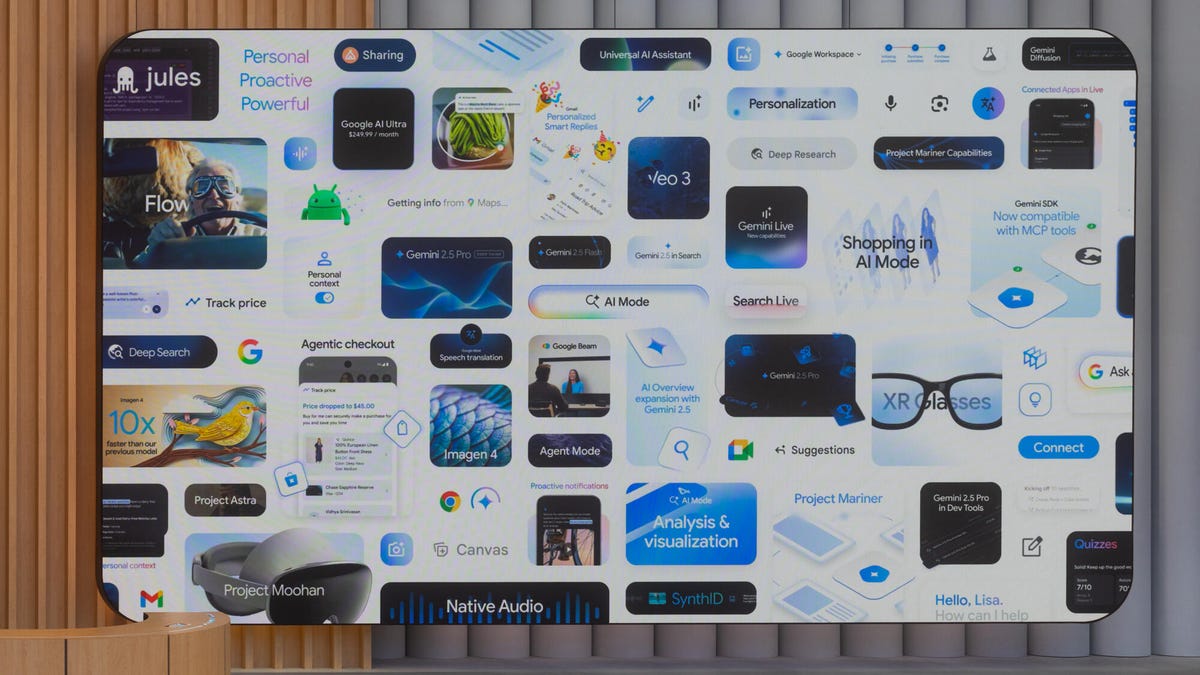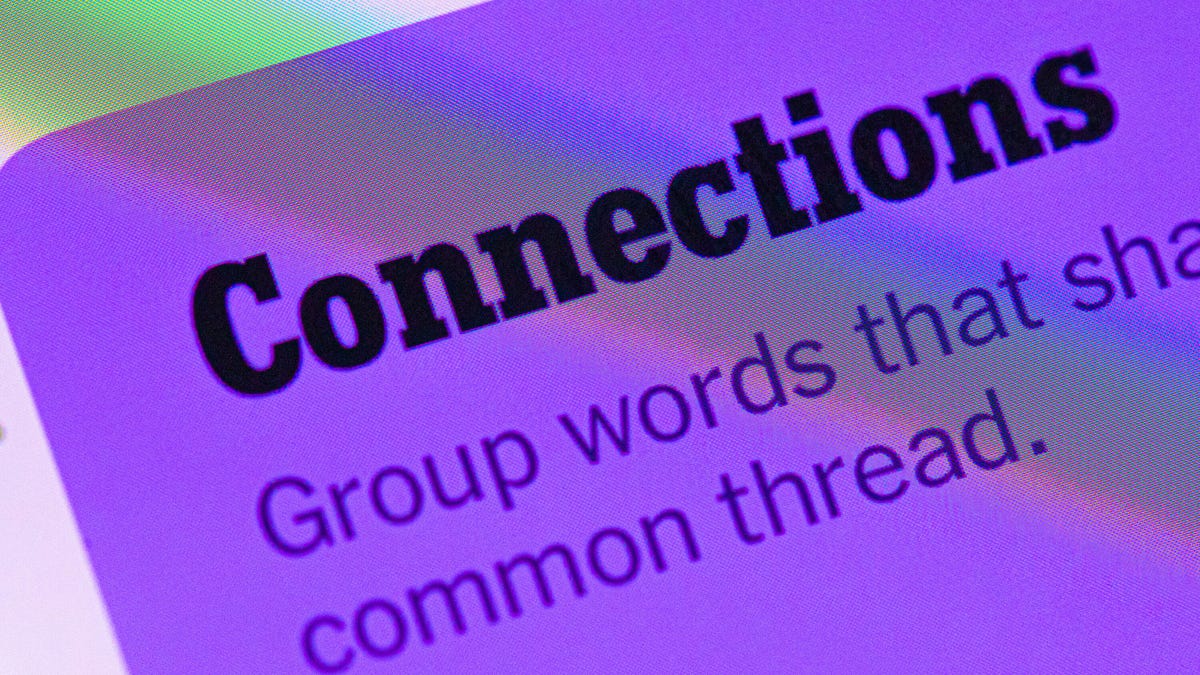Technologies
Google I/O Announcements: The Latest AI Upgrades Coming to Gemini, XR and More
From its new Project Aura XR glasses to Chrome’s wants-to-be-more-helpful AI mode, Gemini Live and new Flow generative video tool, Google puts AI everywhere.

As you’d expect, this year’s Google I/O developer’s conference focused almost exclusively on AI — where the company’s Gemini AI platform stands, where it’s going and how much it’s going to cost you now for its new AI Ultra subscription plan (spoiler: $250 per month). Meanwhile, a new Flow app expands the company’s video-generation toolset, and its Android XR glasses make their debut.
Plus, all AI usage and performance numbers are up! (Given that a new 42.5-exaflop Ironwood Tensor processing unit is coming to Google Cloud later this year, they’ll continue to rise.)
Google’s Project Aura, a developer kit for Android XR that includes new AR glasses from Xreal, is the company’s next step in the company’s roadmap toward glasses-based, AI-driven extended reality. CNET’s Scott Stein goes in-depth in an exclusive interview with Shahram Izadi, Google’s VP and GM for Android XR about that future. And headset-based Project Moohan, developed in conjunction with Samsung, is now available, and Google’s working with Samsung to extend beyond headsets.
For a play-by-play of the event, you can read the archive of our live blog.
Google already held a separate event for Android, where it launched Android 16, debuting its new Material 3 Expressive interface, updates to security and an update on Gemini integration and features.
A lot of the whizzy new AI features are only available via one of its subscription levels. AI Pro is just a rebranding of Google’s $20-per-month Gemini Advanced plan (adding some new features), but Google AI Ultra is a pricier new option — $250 per month, with half off the first three months for the moment — that provides access to the latest, spiffiest and least usage-limited of all its tools and models, as well as a prototype for managing AI agents and the 30 terabytes of storage you’re going to need to store it all. They’re both available today.
Google also wants to make your automation sound smarter with Personalized Smart Replies, which makes your generated answers sound more like you, as well as plowing through pieces of information on your device to provide relevant information. It’ll be in Gmail this summer for subscribers. Eventually, it’ll be everywhere.
Also, it includes lots of better models, better coding tools and other details on developer-friendly things you expect from a developer conference. The announcement included its conversational Gemini Live, formerly part of Project Astra, its interactive, agentic, voice AI, kitchen sink AI app. (As Managing Editor Patrick Holland says, «Astra is a rehearsal of features that, when they’re ready for the spotlight, get added to Gemini Live.») And for researchers, NotebookLM incorporates Gemini Live to improve its… everything.
It’s available now in the US.
Chrome AI Mode
People (that is, those over 18) who pony up for the subscriptions, plus users on the Chrome Beta, Dev and Canary tracks, will be able to try out the company’s expanded Gemini integration with Chrome — summary, research and agentic chat based on the contents of your screen, somewhat like Gemini Live does for phones (which, by the way, is available for free on Android and iOS as of today). But the Chrome version is more suited to the type of things you do at a computer rather than a phone. (Microsoft already does this with Copilot in its own Edge browser.)
Eventually, Google plans for Gemini in Chrome to be capable of synthesizing using multiple tabs and voice navigation.
The company is also expanding how you can interact with its AI Overviews in Google Search as part of AI Mode, with interactions with AI Overviews and more agentic shopping help. It’s a new tab with search, or on the search bar, and it’s available now. It includes deeper searches, Personal Context — which uses all the information it knows about you, and that’s a lot — to make suggestions and customize replies.
The company detailed its new AI Mode for shopping, which has an improved conversational shopping experience, a checkout that monitors for the best pricing, and an updated «try on» interface that lets you upload a photo of yourself rather than modeling it on a generic body.
Google plans to launch it soon, though the updated «try on» feature is now available in the US via Search Labs.
Google Beam
Formerly known as Project Starline, Google Beam is the updated version of the company’s 3D videoconferencing, now with AI. It uses a six-camera array to capture all angles of you, which the AI then stitches together, uses head tracking to follow your movements, and sends at up to 60 frames per second.
The platform uses a light field display that doesn’t require wearing any special equipment, but that technology also tends to be sensitive to off-angle viewing. HP is an old hand in the large-scale scanning biz, including 3D scanning, so the partnership with Google isn’t a big surprise.
Flow and other generative creative tools
Google Flow is a new tool that builds on Imagen 4 and Veo 3 to perform tasks like creating AI video clips and stitching them into longer sequences, or extending them, with a single prompt while keeping them consistent from scene to scene. It also provides editing tools like camera controls. It’s available as part of Gemini AI Ultra.
Imagen 4 image generation is more detailed, with improved tonality and better text and typography. And it’s faster. Meanwhile, Veo 3, also available today, has a better understanding of physics and native audio generation — sound effects, background sounds and dialogue.
Of course, all this is available under the AI Pro plan. Google’s Synth ID gen AI detection tool is also available today.
Technologies
Tom Cruise and Brad Pitt Trade Blows in Latest AI Slop Video, and Hollywood Won’t Stand for It
While some Hollywood icons are feeling doom and gloom over the AI-generated clip, labor unions are fighting back with legal threats.

Brad Pitt and Tom Cruise are trading blows in a viral AI-generated clip on social media, sparking backlash from the film industry. Chinese company ByteDance’s new video generation model, Seedance 2.0, allowed people to create fictional videos of real likenesses with short prompts. Irish filmmaker Ruairi Robinson used two lines to generate the clip of Pitt and Cruise fighting.
If ByteDance sounds familiar to you, it’s because the company also owns TikTok internationally, though it recently sold its US ownership of the social media and video-sharing platform to US companies. Oracle, MGX and Silver Lake each hold a 15% stake.
The actors in this latest viral AI slop video still don’t look like perfect re-creations — close-up shots of the fake Brad Pitt’s face, especially, have an «uncanny valley,» dreamlike AI look where the cuts blend into his flesh a little too smoothly. However, a CNET survey from earlier Tuesday showed that while 94% of US adults believe they encounter AI slop on social media, just 44% say they’re confident they can tell real videos from AI-generated ones.
One of the most inflammatory parts of the Pitt-Cruise video is the dialogue, as the computerized facsimiles of the actors fight over a supposed assassination plot regarding Jeffrey Epstein, the convicted sex offender who maintained ties to rich and powerful people worldwide. The two actors’ likenesses became a vehicle to push conspiracy theories that have been picking up steam as the millions of pages of redacted emails, receipts and other documents that make up the Epstein files continue to trickle out of the US Department of Justice.
Hollywood is fighting back as AI-generated content consumes and spits out actor likenesses and copyrighted content alike. Major studios and their labor forces alike have united to push back against the precedent set by the viral AI video.
According to The Hollywood Reporter, the Motion Picture Association demanded that ByteDance «immediately cease its infringing activity» through Seedance. SAG-AFTRA, the labor union that represents Hollywood performers, released a statement on Friday saying it «stands with the studios» in condemning the Seedance video generation model.
The Screen Actors Guild specifically pointed to Seedance’s unauthorized use of members’ faces, likenesses and voices as a threat that could put actors out of work.
«Seedance 2.0 disregards law, ethics, industry standards and basic principles of consent,» the actors’ guild said in its statement.
Representatives for the MPA and SAG-AFTRA didn’t immediately respond to a request for comment.
Similar videos generated by Seedance have depicted Star Wars characters dueling with lightsabers as well as Marvel superheroes Spider-Man and Captain America brawling. Disney issued a cease-and-desist order to ByteDance on Friday in response to these videos, which it alleges constitute copyright infringement, according to the BBC.
A representative for ByteDance didn’t immediately respond to CNET’s request for comment, but issued a statement to the BBC saying it is «taking steps to strengthen current safeguards as we work to prevent the unauthorized use of intellectual property and likeness by users.»
Following the viral incident, ByteDance updated its tool to prevent people from uploading images of real people for AI-generated content, but it remains to be seen how effective that policy will be. Certainly, it won’t curb the output of videos depicting fictional masked or anthropomorphic characters like Spider-Man or Mickey Mouse.
As AI models continue to create mediocre copies of cultural icons, this won’t be the first — or last — legal battleground for AI video generation.
Technologies
Today’s NYT Connections Hints, Answers and Help for Feb. 18, #983
Here are some hints and the answers for the NYT Connections puzzle for Feb. 18 #983.

Looking for the most recent Connections answers? Click here for today’s Connections hints, as well as our daily answers and hints for The New York Times Mini Crossword, Wordle, Connections: Sports Edition and Strands puzzles.
Today’s NYT Connections puzzle was great fun for me, as I’m the co-author of two pop-culture encyclopedias, one about the 1970s, and 1980s and the other about the 1990s. Two of the categories are retro-themed! Read on for clues and today’s Connections answers.
The Times has a Connections Bot, like the one for Wordle. Go there after you play to receive a numeric score and to have the program analyze your answers. Players who are registered with the Times Games section can now nerd out by following their progress, including the number of puzzles completed, win rate, number of times they nabbed a perfect score and their win streak.
Read more: Hints, Tips and Strategies to Help You Win at NYT Connections Every Time
Hints for today’s Connections groups
Here are four hints for the groupings in today’s Connections puzzle, ranked from the easiest yellow group to the tough (and sometimes bizarre) purple group.
Yellow group hint: Farrah hair.
Green group hint: Totally tubular!
Blue group hint: Bock-bock!
Purple group hint: Can refer to a dairy product or a cosmetic.
Answers for today’s Connections groups
Yellow group: Retro hair directives.
Green group: Retro slang for cool.
Blue group: Chicken descriptors.
Purple group: ____ cream.
Read more: Wordle Cheat Sheet: Here Are the Most Popular Letters Used in English Words
What are today’s Connections answers?
The yellow words in today’s Connections
The theme is retro hair directives. The four answers are crimp, curl, feather and tease.
The green words in today’s Connections
The theme is retro slang for cool. The four answers are bad, fly, rad and wicked.
The blue words in today’s Connections
The theme is chicken descriptors. The four answers are bantam, crested, free-range and leghorn.
The purple words in today’s Connections
The theme is ____ cream. The four answers are heavy, shaving, sour and topical.
Technologies
Today’s Wordle Hints, Answer and Help for Feb. 18, #1705
Here are hints and the answer for today’s Wordle for Feb. 18, No. 1,705.

Looking for the most recent Wordle answer? Click here for today’s Wordle hints, as well as our daily answers and hints for The New York Times Mini Crossword, Connections, Connections: Sports Edition and Strands puzzles.
Today’s Wordle answer is a word I thought I’d seen in Wordle before, but I guess not. The letters aren’t super common, so it may take a few guesses. If you need a new starter word, check out our list of which letters show up the most in English words. If you need hints and the answer, read on.
Read more: New Study Reveals Wordle’s Top 10 Toughest Words of 2025
Today’s Wordle hints
Before we show you today’s Wordle answer, we’ll give you some hints. If you don’t want a spoiler, look away now.
Wordle hint No. 1: Repeats
Today’s Wordle answer has no repeated letters.
Wordle hint No. 2: Vowels
Today’s Wordle answer has two vowels.
Wordle hint No. 3: First letter
Today’s Wordle answer begins with M.
Wordle hint No. 4: Last letter
Today’s Wordle answer ends with L.
Wordle hint No. 5: Meaning
Today’s Wordle answer can refer to an important or powerful person.
TODAY’S WORDLE ANSWER
Today’s Wordle answer is MOGUL.
Yesterday’s Wordle answer
Yesterday’s Wordle answer, Feb. 17, No. 1704 was SQUAD.
Recent Wordle answers
Feb. 13, No. 1700: MOOCH
Feb. 14, No. 1701: BLOOM
Feb. 15, No. 1702: SKULL
Feb. 16, No. 1703: ROOST
-

 Technologies3 года ago
Technologies3 года agoTech Companies Need to Be Held Accountable for Security, Experts Say
-

 Technologies3 года ago
Technologies3 года agoBest Handheld Game Console in 2023
-

 Technologies3 года ago
Technologies3 года agoTighten Up Your VR Game With the Best Head Straps for Quest 2
-

 Technologies4 года ago
Technologies4 года agoBlack Friday 2021: The best deals on TVs, headphones, kitchenware, and more
-

 Technologies5 лет ago
Technologies5 лет agoGoogle to require vaccinations as Silicon Valley rethinks return-to-office policies
-

 Technologies5 лет ago
Technologies5 лет agoVerum, Wickr and Threema: next generation secured messengers
-

 Technologies4 года ago
Technologies4 года agoOlivia Harlan Dekker for Verum Messenger
-

 Technologies4 года ago
Technologies4 года agoiPhone 13 event: How to watch Apple’s big announcement tomorrow
